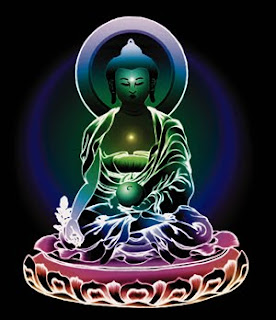 We often talk about Siddhartha, the young man who became known as the Buddha, as if he were a god. The fact is that he was just a simple Indian guy, a human being like you and me. We think of him as some kind of super-genius for having attained complete spiritual awakening, but in fact his real genius was in showing how any one of us can attain the same awakening as he did. We describe him as a prince and a member of the elite royalty of his time, and we think that must have given him an advantage over us -- but the reality is that most of us today are probably better off, in material terms, than Siddhartha was. The point is, we shouldn't mythologize Siddhartha's life and think that his spiritual awakening was due to his special circumstances. Most of us today actually live in conditions very similar to Siddhartha's, in terms of our material situation.
We often talk about Siddhartha, the young man who became known as the Buddha, as if he were a god. The fact is that he was just a simple Indian guy, a human being like you and me. We think of him as some kind of super-genius for having attained complete spiritual awakening, but in fact his real genius was in showing how any one of us can attain the same awakening as he did. We describe him as a prince and a member of the elite royalty of his time, and we think that must have given him an advantage over us -- but the reality is that most of us today are probably better off, in material terms, than Siddhartha was. The point is, we shouldn't mythologize Siddhartha's life and think that his spiritual awakening was due to his special circumstances. Most of us today actually live in conditions very similar to Siddhartha's, in terms of our material situation.James: This is something that many in the West don't understand. They think we worship Buddha when we bow to his statues. I think a segment of this misunderstanding stems from the Western idea of what a religion constitutes. The main religions practiced in the West all have the common denominator of a belief in an omnipotent being that rules over all humanity--a "God." Combine that with a relative cultural isolation of many Americans and you have a recipe for misunderstanding Buddhism and other non-Western belief systems.
Siddhartha was a truth seeker, nothing more. He wasn't looking for religion, as such -- he wasn't particularly interested in religion. He was searching for the truth. He was looking for a genuine path to freedom from suffering. Aren't all of us searching for the same thing? If we look at the life of Siddhartha, we can see that he found the truth and freedom he was seeking only after he abandoned religious practices. Isn't that significant? The one who became the Buddha, the "Awakened One," didn't find enlightenment through religion -- he found it when he began to leave religion behind.
James: I don't think this means that we should abandon monasteries, temples and teachers but it is a necessary caution in reminding practitioners that these things are tools to help us along the path that only we can walk. For example, I think we deify our teachers a bit and lean upon them sometimes too much like a crutch. Yet Buddha was clear that we can know the Dharma like the back of our hand but all that is worthless unless we set out on our own and put them into practice. No one can walk the path for us. No teacher can cure us of our suffering--regardless of how enlightened and talented they may be. So, in that sense Buddhism isn't a religion in the Western sense but rather, perhaps, a spiritual school. Let me be clear, however. It doesn't hurt to practice with others in a physical sangha because it offers us support and encouragement but just remember that Buddha had none of these things. And if he can do it, so can we.
After all, what would you do if you were the last Buddhist on Earth? Would you stop practicing because there were no more teachers, temples, statues and sanghas? Of course not. These things are maps but they aren't the path itself. Spiritual materialism and attachment to it's trimmings is just as sure a pitfall as falling into the delusional hole that we don't need any teaching or guidance at all. Ironically, fittingly and beautifully we come back to the conclusion that Buddhism itself should be approached with the middle-path mindset. The way we view it should be balanced between traditional practice and freelance adaptation to an individuals particular karma.
Neither wrong to attend a temple or monastery nor wrong to be more of a hermit Buddhist as Buddha initially was. Some teachers I have read will actually recommend certain students leave the monastery to study on their own as a hermit. So, there are many paths but only one Dharma. That said, neither I, nor Rinpoche are advocating we do away with Buddhism as a religion but rather to go beyond Buddhism as a religion. This means having the structural integrity of the Dharma as our foundation but we shouldn't let organized religion hold back our practice to where we simply copy someone else's practice. In my years of practice I have found that mimicking the path of someone else is simply yet another delusion.
To read the rest of Rinpoche's insightful article, simply click on this sentence.
~Peace to all beings~
~Peace to all beings~


 @Moderator: It's all that water you drank in the car, I guess.
@Moderator: It's all that water you drank in the car, I guess.















